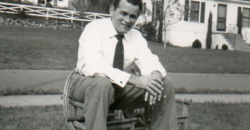oh, daddy.
When I got to his marker, I sat on it,
like sitting on the edge of someone’s bed
and I rubbed the smooth, speckled granite.
I took some tears from my jaw and neck
and started to wash a corner of his stone.
Then a black and amber ant
ran out onto the granite, and off it,
and another ant hauled a dead
ant onto the stone, leaving it, and not coming back.
Ants ran down into the grooves of his name
and dates, down into the oval track of the
first name’s O, middle name’s O,
the short O of his last name,
and down into the hyphen between
his birth and death–little trough of his life.
Soft bugs appeared on my shoes,
like grains of pollen, I let them move on me,
I rinsed a dark fleck of mica,
and down inside the engraved letters
the first dots of lichen were appearing
like stars in early evening.
I saw the speedwell on the ground with its horns,
the coiled ferns, copper-beech blossoms, each
petal like that disc of matter which
swayed, on the last day, on his tongue.
Tamarack, Western hemlock,
manzanita, water birch
with its scored bark,
I put my arms around a trunk and squeezed it,
then I lay down on my father’s grave.
The sun shone down on me, the powerful
ants walked on me. When I woke,
my cheek was crumbly, yellowish
with a mustard plaster of earth. Only
at the last minute did I think of his body
actually under me, the can of
bone, ash, soft as a goosedown
pillow that bursts in bed with the lovers.
When I kissed his stone it was not enough,
when I licked it my tongue went dry a moment, I
ate his dust, I tasted my dirt host.
-Sharon Olds
One year seems incomprehensible. And then two. In his absence, I lived in Munich, finished college. Then four years. Graduate school, a marriage, a job. Then eight, ten, fifteen. Trips around the world, work. A divorce. A marriage. A child. Eighteen years, then twenty. Twenty-five. Unthinkable. Another child. Deaths and disappointments, great chest lifting joys, a book and then two then three and now eight. A high school graduation for your first granddaughter from me, and now a college one. And you, my dear sweet father, you missed it all. All except the birth, the skinned knees, the piano lessons, the sledding down steep wild hills, the sits in your lap, Sunday afternoon football, the obsession with Johnny Unitas, the blackberry picking and cobblers, the whistles at suppertime to call me in from the creek, the Sunday School, the Big Church, the Hillcrest Elementary School, the dropping everything to pick me up, the dances on your black wingtip shoes, the junior high angst, the high school marching band, the friends, the sleepovers, the midnight frenzied drives to the emergency room, you clutching your chest, you human rivet the loss around which my life has spun, the strong point that has held it together, even in your absence.
Thirty-six years. One year. The same.
What were you doing thirty-six years ago today? Do you know?
My friend Elina Rodriguez posted something on Facebook five years ago that stopped me. I had heard parts of her moving story of coming to the U.S. before, but I didn’t understand that as she experienced her treacherous journey to the U.S., I was in a hospital intensive care waiting room as my father lay dying. Elina wrote: “Thirty years ago today, at 2am, I left my home in Havana, Cuba. Hope and Faith sustained me during the longest 3 days of my life, journeying from Mariel harbor to the land of some unknown thing called ‘freedom’.”
Daddy would die on the second day of Elina’s trip; I was struck by the parallels of the journeys, so different and yet shared. Elina wrote back: “Patti, thirty-six years ago tomorrow, I was in an overcrowded lobster fishing boat, with 120 other people including my 2-year-old son, “refuged” from a storm in a harbor controlled by authorities that had banned us as ‘traitors’, hungry, thirsty, not able to go back and not able to go forward, unable to touch land anywhere–Striking that we were both journeying; he to a place of peace. My love is with you.”
We are all on a shared journey.
I miss Daddy. Can you tell? It was his heart that gave out. My job, all these years later, is to make sure that you know who he was. Melvin Lonnie Digh. We keep people alive by telling their stories.
Death ends a life, not a relationship.
Daddy died on Mother’s Day weekend; we found the cards he had bought for my mother in the trunk of his car after he died, signed and ready days ahead of time.
Please, please listen to these nine minutes and forty-five seconds, and pass it along to others who will also listen (from the audiobookversion of Life is a Verb). The end of the recording may give you some idea of my loss, all these years later:
Click here to listen to Live An Irresistible Obituary.







